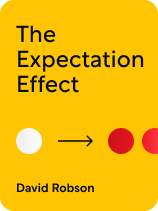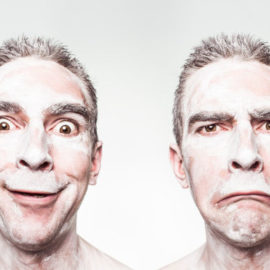

This article is an excerpt from the Shortform book guide to "The Expectation Effect" by David Robson. Shortform has the world's best summaries and analyses of books you should be reading.
Like this article? Sign up for a free trial here.
What is David Robson’s The Expectation Effect about? Do your expectations always become your reality?
Science writer David Robson argues in The Expectation Effect that your brain’s predictions about your body, your health, your intellect, and your emotions are so powerful that they create your reality. By changing what your brain predicts, you can change the reality your brain creates for you and the limits it sets for you.
Read below for a brief overview of The Expectation Effect.
The Expectation Effect by David Robson
We’re shaped by what we believe about ourselves and the world around us. Our brains, bodies, and environments conspire to create what researchers call expectation effects, so that what we expect to be or do becomes our reality. This is a basic consequence of the brain’s use of predictions: It constructs our reality using not only the information we perceive with our senses but also our experiences and the expectations we learn by observing the world around us.
David Robson’s The Expectation Effect argues that if you let them, expectation effects can harm your physical and mental well-being. For example, if you expect to age poorly, you might experience more illnesses as you get older. However, expectation effects can also be positive. By learning how this process works in the brain, you can use expectation effects to improve your response to stress, your attitudes toward food, your ability to push yourself in exercise, and even your health as you age.
Robson is a science writer and the author of The Intelligence Trap (2019). He explains that after his encounter with depression, he became interested in the brain’s ability to influence our well-being, which led to 2022’s The Expectation Effect.
What Are Expectation Effects?
An expectation effect occurs when your beliefs exert an influence over your well-being, as when you take a pill for a headache and feel better not because of what’s in the pill but because you expect the pill to cure your headache. According to Robson, your body, brain, and the culture you live in create these effects, which are powerful and pervasive. In this section of the guide, we’ll explore how the brain’s perception process creates expectation effects and how what we believe becomes our reality.
How Does Your Brain Construct Your Reality?
To understand how expectation effects work, it helps to know that your brain doesn’t just perceive reality—it actively constructs it. Robson explains that as you perceive the world around you, your brain draws on information relayed by your senses as well as information inferred from your past experiences. In the process, your brain generates predictions about the sensory information it receives, like when you see a fly and your brain predicts its path so that you can swat it away from your face. The brain constructs a representation of what it thinks is happening and what it predicts will happen, and you perceive this representation as reality.
The brain relies heavily on these predictions. The visual cortex, the region of the brain that processes information received from the eyes, has extensive connections to other brain regions that make predictions—which illustrates how the brain is wired to rely on prior knowledge. Robson notes that it makes evolutionary sense for the brain to depend on predictions: Using predictions to inform perception reduces the amount of sensory information it has to process and enables it to focus on surprising sensory details, like the snake that you might just step on if your brain doesn’t alert you to get out of the way.
Robson points out that although the brain is good at making predictions, it can sometimes get tripped up. Your feelings and expectations can bias your brain’s predictions, like when you’re feeling nervous and your expectations about the situation make you think someone looks angry when they aren’t. Though perception feels objective, it’s not. As we’ll see in the next section, your body sometimes acts on your brain’s mistaken predictions, creating expectation effects.
How Do Your Beliefs Become Your Reality?
Expectation effects come into play because when it comes to predictions about our own bodies and minds, our expectations exert such a strong influence that the brain makes them true. Robson explains that this often happens because the brain produces physiological changes throughout the body, like when you take an herbal remedy that might not reduce your aches and pains on its own, but works because your brain signals your body to reduce inflammation when you take it.
Our memories and beliefs aren’t the only sources of predictions that become reality. Robson notes that sometimes, our expectations come from the culture around us, for example, when we absorb the message that growing older means getting slower or weaker. If we believe this message strongly enough, the brain makes it our reality as we age.
What About Positive Thinking or the Law of Attraction?
Robson emphasizes that expectation effects are not the same thing as positive thinking or the law of attraction, which he characterizes as “pseudoscience.” The law of attraction is the principle that positive thoughts can attract the things you want. By contrast, expectation effects work via psychological and physiological mechanisms set in motion by the specific expectations we have about our bodies or minds.
How to Handle Expectation Effects That Influence Your Physical Well-Being
Now that we understand how physiological and psychological expectation effects work, we’ll look at specific expectation effects that you might recognize from your own life. For each, we’ll also explore how you can either prevent it from happening or put it to use to improve your physical or mental health. First, we’ll explore expectation effects that affect your physical health. Though we’re separating expectation effects that influence our physical well-being from those that influence our psychological well-being, Robson emphasizes that an expectation effect that influences your body can (and will) influence your mind, and vice versa. That’s one reason why expectation effects are so powerful.
Placebo Effect
Perhaps the most well-known expectation effect is the placebo effect. A placebo is a treatment that doesn’t exert a direct chemical effect on the body but can have an indirect effect because of our expectations. Robson explains that when we think a placebo treatment will work, these expectations can create the same biological effects we’d experience with the actual treatment. This works even when we know that we’re taking a placebo because our subconscious expectations still tell the brain that it should start the biological processes that promote healing.
Nocebo Effect
The brain’s predictive processing also produces an expectation effect that is in many ways the reverse of the placebo effect: the nocebo effect. This effect occurs when we expect to experience a symptom or illness and then develop it. According to Robson, this isn’t a result of hypochondria and it’s not all “in your head”: An expectation of getting sick signals the brain to enact the same physiological changes brought on by a real pathogen. Scientists have even observed extreme cases where the nocebo effect increases our risk of death.
Psychogenic Illness
Nocebo responses can be contagious, and people can transmit expectations of illness via social contagion. Robson reports that occasionally, this manifests as an outbreak of a psychogenic illness, a mass illness with a psychological origin. Psychogenic illnesses result when expectations about a disease spread. It starts with one person, who experiences symptoms and talks about them. Then it spreads, affecting people who weren’t exposed to the actual or assumed environmental origin, like when Tourette-like tics spread across TikTok.
Physical Limits in Sports and Exercise
Another place that expectation effects manifest is in your body’s regulation of what you can do in a workout or practice session. In fact, Robson reports that your limits in sports or exercise might be more psychological than physical. Your brain predicts how much effort you can expend and at what intensity and limits your performance accordingly. It makes sense for the brain to tend toward conservative estimates of our physical capabilities, which can help us to conserve energy and control the risk for injury.
Responses to Food
Expectation effects also play a role in how your body responds to food. Robson explains that your feelings about food determine whether you enjoy your meals, feel full after eating, and maintain a healthy weight over time. That’s because your mindset about food influences your physiological response. A feeling of enjoying your food rather than depriving yourself for the sake of health makes a difference. If you eat a healthy meal and expect that it won’t fill or nourish you, that prediction comes true: Your body may not absorb the nutrients, and you may feel hungry again soon after eating.
Aging
Expectation effects can even influence how you age and how long you live—that’s how powerful your beliefs about aging are. Robson reports that your expectations about aging might be just as important as your actual age in determining your well-being. People with negative attitudes toward aging—like expecting to experience illness and frailty with age—are more likely to develop heart problems and stroke. Conversely, people with positive attitudes about aging—like higher expectations for the energy level and usefulness they’ll feel as they age—seem to have a lower risk for some types of dementia.
To age better and live longer, Robson recommends adopting a few strategies:
How to Handle Expectation Effects That Influence Your Mental Well-Being
Next, we’ll look at expectation effects that influence your mental and emotional health.
Stress Response
Expectation effects play a role in our response to many feelings, including stress. Robson thinks stress may hurt us not because it’s inherently harmful but because we believe it’s bad for us. This means that we experience negative physiological effects from stress when we encounter it because we expect them.
Insomnia
Just as an expectation effect worsens our experience with stress via a negative psychological response, a similarly negative response makes insomnia worse than it needs to be, according to Robson. When we lie awake at night, wishing we were asleep, we fall into ruminative patterns of thought that keep us awake longer. Worrying about sleep causes more sleep loss, and experts think that worrying about not getting enough sleep is worse for your health than actually getting inadequate sleep.
Limits of Self-Control and Mental Focus
Expectation effects also curtail your mental ability. Robson explains that we tend to assume that we have a limited amount of self-control and mental focus, but research shows that we place these limitations on ourselves. Whether you believe that your mental resources are limited or unlimited matters: The power of this belief means that expecting mental effort to feel energizing or anticipating that you can improve your concentration with effort can make these things true.
Intelligence and Creativity
Finally, expectation effects also influence the quality of the intelligence or creativity you can bring to a specific task. Robson points out that your expectations about your abilities often come from people around you. When you face a challenging task and think you are (or aren’t) up to the task, your expectations will likely come true. Memory, problem-solving, intellectual stamina, and resilience are influenced by what we believe about ourselves.

———End of Preview———
Like what you just read? Read the rest of the world's best book summary and analysis of David Robson's "The Expectation Effect" at Shortform.
Here's what you'll find in our full The Expectation Effect summary:
- Why you should rely on your body, not the universe, to make you happier
- How your brain can control your health, longevity, and quality of life
- Why you should focus on the benefits of getting older, rather than fearing it






